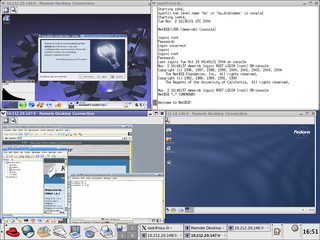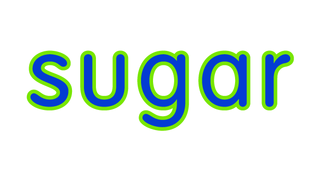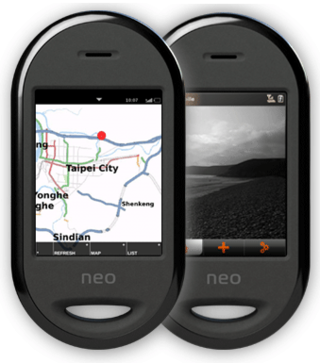| Developer(s) | Lina Software |
|---|---|
| Stable release | 1.00 beta1 / October 15, 2009 |
| Written in | C, C++, Python |
| Operating system | Windows, Mac OS X |
| Type | Compatibility layer |
| License | GNU General Public License v2 |
| Website | www.openlina.com (inactive) (archived version) |
LINA was a piece of open-source software that enabled users to run applications compiled for Linux under Windows and Mac OS X with a native look and feel. [1] Version 1.00 beta1 was released in October 2009 and was available at the Open Lina web site. However, that domain is now up for sale.
The latest binary version, still a beta, was released on October 15, 2009. As the tool was open sourced under the terms of the GNU General Public License v2, its source code had been made available since July 19, 2007.

The Common Desktop Environment (CDE) is a desktop environment for Unix and OpenVMS, based on the Motif widget toolkit. It was part of the UNIX 98 Workstation Product Standard, and was for a long time the Unix desktop associated with commercial Unix workstations. It helped to influence early implementations of successor projects such as KDE and GNOME, which largely replaced CDE following the turn of the century.

Mandriva Linux is a discontinued Linux distribution developed by Mandriva S.A.

Wine is a free and open-source compatibility layer to allow application software and computer games developed for Microsoft Windows to run on Unix-like operating systems. Developers can compile Windows applications against WineLib to help port them to Unix-like systems. Wine is predominantly written using black-box testing reverse-engineering, to avoid copyright issues. No code emulation or virtualization occurs. Wine is primarily developed for Linux and macOS.

Solaris is a proprietary Unix operating system originally developed by Sun Microsystems. After the Sun acquisition by Oracle in 2010, it was renamed Oracle Solaris.
UNICOS is a range of Unix and later Linux operating system (OS) variants developed by Cray for its supercomputers. UNICOS is the successor of the Cray Operating System (COS). It provides network clustering and source code compatibility layers for some other Unixes. UNICOS was originally introduced in 1985 with the Cray-2 system and later ported to other Cray models. The original UNICOS was based on UNIX System V Release 2, and had many Berkeley Software Distribution (BSD) features added to it.
Darwin is the core Unix-like operating system of macOS, iOS, watchOS, tvOS, iPadOS, audioOS, visionOS, and bridgeOS. It previously existed as an independent open-source operating system, first released by Apple Inc. in 2000. It is composed of code derived from NeXTSTEP, FreeBSD, other BSD operating systems, Mach, and other free software projects' code, as well as code developed by Apple.

OpenOffice.org (OOo), commonly known as OpenOffice, is a discontinued open-source office suite. Active successor projects include LibreOffice, Apache OpenOffice and Collabora Online.

Xen is a free and open-source type-1 hypervisor, providing services that allow multiple computer operating systems to execute on the same computer hardware concurrently. It was originally developed by the University of Cambridge Computer Laboratory and is now being developed by the Linux Foundation with support from Intel, Citrix, Arm Ltd, Huawei, AWS, Alibaba Cloud, AMD, Bitdefender and epam.

Ubuntu is a Linux distribution derived from Debian and composed mostly of free and open-source software. Ubuntu is officially released in multiple editions: Desktop, Server, and Core for Internet of things devices and robots. The operating system is developed by the British company Canonical and a community of other developers, under a meritocratic governance model. As of April 2024, the most-recent long-term support release is 24.04.

Free and open-source software (FOSS) is software that is available under a license that grants the right to use, modify, and distribute the software, modified or not, to everyone free of charge. The public availability of the source code is, therefore, a necessary but not sufficient condition. FOSS is an inclusive umbrella term for free software and open-source software. FOSS is in contrast to proprietary software, where the software is under restrictive copyright or licensing and the source code is hidden from the users.
Linux adoption is the adoption of Linux computer operating systems (OS) by households, nonprofit organizations, businesses, and governments.

Sugar is a free and open-source desktop environment designed for interactive learning by children. It was developed by SugarLabs. Developed as part of the One Laptop per Child (OLPC) project, Sugar was the default interface on OLPC XO-1 laptop computers. The OLPC XO-1.5 and later provided the option of either the Gnome or Sugar interfaces.

Linux is a generic name for a family of open-source Unix-like operating systems based on the Linux kernel, an operating system kernel first released on September 17, 1991, by Linus Torvalds. Linux is typically packaged as a Linux distribution (distro), which includes the kernel and supporting system software and libraries, many of which are provided by the GNU Project.

FreeBSD is a free and open-source Unix-like operating system descended from the Berkeley Software Distribution (BSD). The first version of FreeBSD was released in 1993 developed from 386BSD and the current version runs on IA-32, x86-64, ARM, PowerPC and RISC-V processors. The project is supported and promoted by the FreeBSD Foundation.

Openmoko is a discontinued project to create a family of mobile phones that are open source, including the hardware specification, the operating system, and actual smartphone development implementation like the Neo 1973 and Neo FreeRunner. The whole project was sponsored by Openmoko Inc.

The history of free and open-source software begins at the advent of computer software in the early half of the 20th century. In the 1950s and 1960s, computer operating software and compilers were delivered as a part of hardware purchases without separate fees. At the time, source code—the human-readable form of software—was generally distributed with the software, providing the ability to fix bugs or add new functions. Universities were early adopters of computing technology. Many of the modifications developed by universities were openly shared, in keeping with the academic principles of sharing knowledge, and organizations sprung up to facilitate sharing.
IcedTea is a build and integration project for OpenJDK launched by Red Hat in June 2007. IcedTea also includes some addon libraries: IcedTea-Web is a free software implementation of Java Web Start and the Java web browser applet plugin. IcedTea-Sound is a collection of plugins for the Java sound subsystem, including the PulseAudio provider which used to be included with IcedTea. The Free Software Foundation recommends that all Java programmers use IcedTea as their development environment.
Linux began in 1991 as a personal project by Finnish student Linus Torvalds to create a new free operating system kernel. The resulting Linux kernel has been marked by constant growth throughout its history. Since the initial release of its source code in 1991, it has grown from a small number of C files under a license prohibiting commercial distribution to the 4.15 version in 2018 with more than 23.3 million lines of source code, not counting comments, under the GNU General Public License v2 with a syscall exception meaning anything that uses the kernel via system calls are not subject to the GNU GPL.

The GNU General Public License is a series of widely used free software licenses, or copyleft, that guarantee end users the four freedoms to run, study, share, and modify the software. The license was the first copyleft for general use and was originally written by Richard Stallman, the founder of the Free Software Foundation (FSF), for the GNU Project. The license grants the recipients of a computer program the rights of the Free Software Definition. The licenses in the GPL series are all copyleft licenses, which means that any derivative work must be distributed under the same or equivalent license terms. It is more restrictive than the Lesser General Public License and even further distinct from the more widely-used permissive software licenses such as BSD, MIT, and Apache.

According to the Free Software Foundation Latin America, Linux-libre is a modified version of the Linux kernel that contains no binary blobs, obfuscated code, or code released under proprietary licenses. In the Linux kernel, they are mostly used for proprietary firmware images. While generally redistributable, binary blobs do not give the user the freedom to audit, modify, or, consequently, redistribute their modified versions. The GNU Project keeps Linux-libre in synchronization with the mainline Linux kernel.